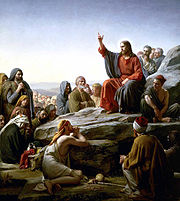- Ébionites
-
Ébionisme
 Les Ébionites étaient une secte religieuse chrétienne qui suivait la Loi juive mais en accord avec la doctrine de Jésus dans son sermon sur la montagne[1]. Image : Le Sermon de la Montagne par Carl Heinrich Bloch, 1890.
Les Ébionites étaient une secte religieuse chrétienne qui suivait la Loi juive mais en accord avec la doctrine de Jésus dans son sermon sur la montagne[1]. Image : Le Sermon de la Montagne par Carl Heinrich Bloch, 1890.
Les Ébionites (de l'hébreu אביונים, Evyonim, « les Pauvres ») étaient une secte judéo-chrétienne qui vécut dans et aux alentours de la terre d'Israël du Ier au Ve siècle[1]. Le mot « evyon » apparaît dans plusieurs textes religieux, comme les Manuscrits de la Mer Morte[2], l'Épître de Jacques[3] et l'Évangile selon Luc, qui comprend l'une des bénédictions les plus connues de Jésus : « Heureux vous qui êtes pauvres, car le royaume de Dieu est à vous ! » (Luc 6:20, voir aussi Matthieu 5:3)[4]. Les Ébionites auraient donc été des Juifs disciples de Jésus qui se seraient dépossédés de tous les biens matériels et vivaient en communautés religieuses[1].
Sans preuves archéologiques établies en faveur de l'existence des Ébionites, leurs doctrines et leur histoire ne peuvent être reconstruites qu'à partir de références textuelles. Le peu que nous en savons provient de références critiques rédigées par des théologiens et écrivains influents de l'Église chrétienne qui les considéraient comme des « judaïsants » et des « hérétiques »[5]. Cependant, d'après certains chercheurs modernes ayant étudié l'historicité des Ébionites, ceux-ci seraient plutôt des disciples de la première heure de l'Église de Jérusalem qui furent graduellement marginalisés par les disciples de Paul de Tarse, en dépit du fait qu'ils pourraient avoir été plus fidèles aux authentiques enseignements du Jésus historique[6],[7],[3],[8].
Sommaire
Histoire
Croyances et observances
Judaïsme
Essénisme ou gnosticisme ?
Jésus
Jean le Baptiste
Jacques le Juste
Paul de Tarse
Écrits
Archéologie
Bibliographie
- Simon Claude Mimouni, Les chrétiens d'origine juive dans l'Antiquité, Albin Michel, coll. « Présences du judaïsme poche » (no 29), Paris, 261 p., 2004 (ISBN 2-226-15441-8)
Voir aussi
Notes et références
- ↑ a , b et c Tabor, James D., Ancient Judaism: Nazarenes and Ebionites, The Jewish Roman World of Jesus, Department of Religious Studies, University of North Carolina at Charlotte, 1998. Consulté le 31 septembre 2006.
- ↑ Eisenman, Robert & Wise, Michael, The Dead Sea Scrolls Uncovered, 1992, Spring (ISBN 1852303689).
- ↑ a et b Eisenman, Robert James the Brother of Jesus: The Key to Unlocking the Secrets of Early Christianity and the Dead Sea Scrolls, 1992, Viking (ISBN 1842930265).
- ↑ Miller, Robert J., The Complete Gospels: Annotated Scholars Version, Polebridge Press, 1994 (ISBN 0-944344-49-6).
- ↑ Klijn A.F.J. & Reinink, G.J., Patristic Evidence for Jewish-Christian Sects, Brill, 1973 (ISBN 9004037632).
- ↑ Schoeps, Hans-Joachim, Jewish Christianity: Factional Disputes in the Early Church, trad. Douglas R. A. Hare, Fortress Press, 1969.
- ↑ Maccoby, Hyam, The Mythmaker: Paul and the Invention of Christianity, Harper & Collins, 1987 (ISBN 0062505858).
- ↑ Tabor, James D., The Jesus Dynasty: A New Historical Investigation of Jesus, His Royal Family, and the Birth of Christianity, Simon & Schuster, 2006 (ISBN 0743287231).
- Portail de la culture juive et du judaïsme
- Portail du christianisme
Catégories : Histoire du christianisme | Thèmes judéo-chrétiens | Mystique juive
Wikimedia Foundation. 2010.
